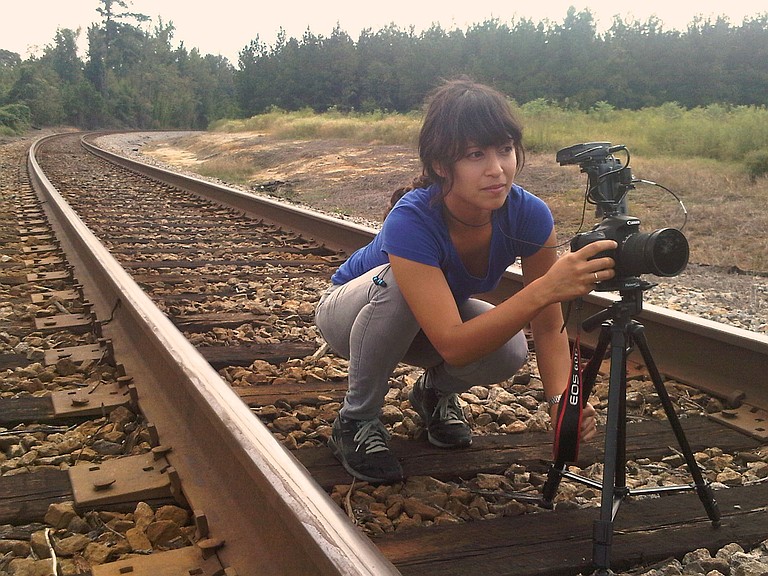Filmmaker Lisa Biagiotti explored how various Mississippians deal with HIV/AIDS in “deepsouth.” Courtesy Lisa Biagiotti
Wednesday, April 10, 2013
Lisa Biagiotti drove 13,000 miles, went on more than a dozen road trips and talked to upwards of 400 people across the rural South to film a documentary about the rural South and how the HIV/AIDS epidemic affects the people there. A native of New York, she has a master's degree in journalism from Columbia University, and has written and produced for the Los Angeles Times, PBS, and other publications and television networks.
Her critically acclaimed documentary, "deepsouth," follows three main story lines: Josh, a college student from the Mississippi Delta who seeks support and mentorship with an underground gay family in Jackson; Monica and Tamela, who host a retreat in Louisiana for people who dealing with HIV/AIDS; and Kathie, who spends most of the year on the road speaking about a change in policy and funding regarding the disease.
Biagiotti recently talked with us about her documentary, which is showing this year at the Crossroads Film Festival. See the film April 13 at 5:15 p.m. on Screen C at the Malco (2211 Grandview Blvd., Madison).
How did you get into filmmaking?
I'm a journalist by trade. Film is just a medium for me to use, (but) I also write and do multimedia journalism. The film for me was just a medium that I could work in. This is my first independent feature. I have done longer-form TV documentaries and also short-form videos for television and online as well.
What brought you into this particular topic?
I was working on some stories in Jamaica (for PBS) on homophobia and HIV in Jamaica, and I just came across some statistics in the South. I was really surprised by them, so I just started driving across the South and talking to people.
In order to film, I had a grant from MAC cosmetics, and I liquidated my retirement funds to finish it.
That seems like a big investment of your money.
Yeah, it was, but I think what I saw as I was going across the South was that this wasn't what I thought it was. Every time I talked to somebody, or everywhere I went, it wasn't the same disease. It's the same virus. It's not the same disease as I grew up knowing about, you know, HIV/AIDS. It was much more of social illness in the South, and it was an indicator of a lot of other things, of a region in crisis. That's kind of bold to say as a northerner about the South, but southerners are kind of always doing it themselves, and you don't hear them clamoring for services and funding and all that. That doesn't match the magnitude of the need in the South.
Did you have any preconceptions about the South?
You know, I didn't. I certainly heard of the Civil War South. I grew up learning about that. But the more time I spent in the South, the more it felt familiar. My mother is Jamaican, and her family, her upbringing, the food, the conversation, the secrets they keep, all those things reminded me of the South. The culture seemed to me very similar. They both have legacies of slavery. They're both extremely conservative and religious. The emphasis on family and never wanting to shame your family, and the things that you don't talk about, those were the things that reminded me of my own family.
How was your experience being around the South: the people, the places, everything?
The themes of the film are isolation, inertia, family, community (and) fighting against the system, and I think my experience in the South has touched on all of those themes. There were times when I felt extremely isolated, or I felt like I didn't know what I was looking for or what I was investigating. There were times where I felt like Monica and Tammy (characters in the film), doing everything for myself, or like Josh, just kind of running in place and exerting energy, and I certainly felt like Kathie, who is this road warrior who goes around and says the same thing over and over again. I've certainly felt that frustration.
There were moments when I really felt like I wanted to give up because it was difficult. Things weren't panning out, and I didn't know what story I was telling, and then something happened, or my subjects, who are very resilient, start giving me advice and not to give up and do all those things. I think it's a blend of emotions, this range from being completely isolated and frustrated to having a sense of community. All the subjects are going to be in Jackson at Crossroads. They were joking with me just last week saying we're like the "deepsouth" family. They didn't know each other before the film, at all, and that's also part of the problem which is that the geography affects connections.
Are you working on any other projects?
I'm really focused on "deepsouth" right now. I have a couple of ideas, but it's "deepsouth" all the time right now.
It's great because organizations are calling me and asking me to bring the film. I was just in Oxford (Miss.). I'm going to Minneapolis, Boston and then Jackson, and then I have a five-stop tour in Alabama. Then I'm going to Houston, too, and then Key West and New York. I can't really keep up. There's not really time for the next project.

Comments
Use the comment form below to begin a discussion about this content.
Sign in to comment
Or login with:
OpenID